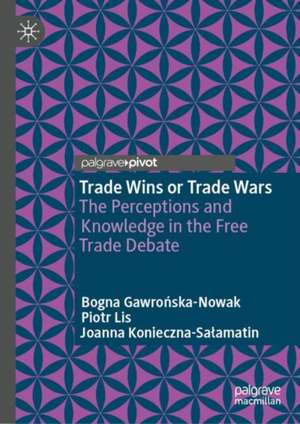Trade Wins or Trade Wars: The Perceptions and Knowledge in the Free Trade Debate
Autor Bogna Gawrońska-Nowak, Piotr Lis, Joanna Konieczna-Sałamatinen Limba Engleză Hardback – 11 iul 2021
Preț: 486.21 lei
Nou
Puncte Express: 729
Preț estimativ în valută:
93.03€ • 97.49$ • 76.91£
93.03€ • 97.49$ • 76.91£
Carte tipărită la comandă
Livrare economică 11-25 aprilie
Preluare comenzi: 021 569.72.76
Specificații
ISBN-13: 9783030769963
ISBN-10: 3030769968
Pagini: 177
Ilustrații: XVIII, 173 p. 25 illus.
Dimensiuni: 148 x 210 mm
Greutate: 0.38 kg
Ediția:1st ed. 2021
Editura: Springer International Publishing
Colecția Palgrave Pivot
Locul publicării:Cham, Switzerland
ISBN-10: 3030769968
Pagini: 177
Ilustrații: XVIII, 173 p. 25 illus.
Dimensiuni: 148 x 210 mm
Greutate: 0.38 kg
Ediția:1st ed. 2021
Editura: Springer International Publishing
Colecția Palgrave Pivot
Locul publicării:Cham, Switzerland
Cuprins
Chapter 1: Introduction.- Chapter 2: Free trade or trade wins: retrospective worldview.- Chapter 3: Free trade or trade wars: controversies, political interests and narratives.- Chapter 4: Globalization and international trade in the eyes of the polish society.- Chapter 5: Academic expert knowledge on free trade.- Chapter 6: Online free trade discourse: expert knowledge and attitudes.- Chapter 7: Sentiment and emotions in the popular FTA discourse.- Chapter 8: Media and populism.
Notă biografică
Bogna Gawrońska-Nowak is Associate Professor and Head of the EURDATA Department at the Institute of Urban and Regional Development in Warsaw, Poland.
Piotr Lis is Associate Professor at the School of Economics, Finance and Accounting and Associate of the Research Centre for Financial and Corporate Integrity at Coventry University, UK.
Joanna Konieczna-Sałamatin is Associate Professor in the Faculty of Sociology at the University of Warsaw, Poland. She is Vice-President in charge of research at the Institute for Socio-Economic Enquiry (iSEE), Poland.
Piotr Lis is Associate Professor at the School of Economics, Finance and Accounting and Associate of the Research Centre for Financial and Corporate Integrity at Coventry University, UK.
Joanna Konieczna-Sałamatin is Associate Professor in the Faculty of Sociology at the University of Warsaw, Poland. She is Vice-President in charge of research at the Institute for Socio-Economic Enquiry (iSEE), Poland.
Textul de pe ultima copertă
This book tackles the disconnect between social perceptions and expert knowledge regarding trade policy decisions. Using a Polish language internet database, the authors shed light on areas that need to be addressed when considering the adoption of particular trade policies by applying content and statistical analysis to produce an easy to deploy measure of populism in digital media, the “Media Populism Ratio”.
Defining a mismatch between social perception and expert knowledge may contribute to a better understanding of the controversies on free trade, as well as properly defining possible sources of populism and social conflicts – therefore also revealing some potential weaknesses in the trade policy implementation level which are at times neglected or underestimated. The book will be relevant to students and researchers interested in economic policy, economic narratives and cultural economics.
Bogna Gawrońska-Nowak is Associate Professor and Head of the EURDATA Department at the Institute of Urban and Regional Development in Warsaw, Poland.
Piotr Lis is Associate Professor at the School of Economics, Finance and Accounting and Associate of the Research Centre for Financial and Corporate Integrity at Coventry University, UK.
Joanna Konieczna-Sałamatin is Associate Professor in the Faculty of Sociology at the University of Warsaw, Poland. She is Vice-President in charge of research at the Institute for Socio-Economic Enquiry (iSEE), Poland.
Piotr Lis is Associate Professor at the School of Economics, Finance and Accounting and Associate of the Research Centre for Financial and Corporate Integrity at Coventry University, UK.
Joanna Konieczna-Sałamatin is Associate Professor in the Faculty of Sociology at the University of Warsaw, Poland. She is Vice-President in charge of research at the Institute for Socio-Economic Enquiry (iSEE), Poland.
Caracteristici
Introduces the social perception of free trade Applies a new methodological approach towards measuring polarization and populism in the media Formulates policy recommendations based on a still insufficiently recognized study area of social perceptions provided by the Internet
